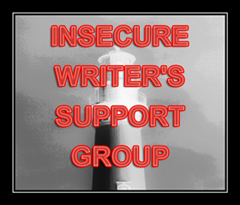Today, Wednesday 1st April is the moment that sees great events collide – and for some that means never believe anything – there could be a prank lurking.
For me this is the first day of the Blogging from A to Z (April 2015) Challenge, the monthly Insecure Writers Support Group post, and the day when submissions open at Crooked Cat – very relevant as I am an avid Cat reader with dozens of their books on my Kindle.
After all the valuable comments from my beta readers, and the involvement of my excellent editor, Sue Barnard, I intend to be submitting “Storms Compass”, the first part of my “Gossamer Flames” saga. Whether it is suitable remains to be seen.
LATEST NEWS ON APRIL 3rd: I have decided that I will not be submitting “Storms Compass” to Crooked Cat, as (a) it is not suitable due to the overt fantasy/shamanic aspect; (b) it still needs a stronger overarching plot-line with the distinct protagonist and antagonist appearing more; (c) it’s too short still at 45,600 words..
On to IWSG and today’s insecurity – or rather an insecurity that’s been told to wait in the garden. Many experts talk about the right arcs/stages to make a novel work – and the wrong ones. Which method do you use?
I’ve been looking at my WIPs to see if the stages are in the right place. I admit that I am a plotter, but I structure as the story unfolds in my head, then scrawl notes, and then make an outline/guideline. But I don’t use arcs or stages to work anything out – when the story reaches 25% it moves on of its own accord. No forceful persuasion.
And my first drafts, especially the most recent? They are, without consciously plotting them that way, following those prescribed arcs. Why?
I recollect that Joseph Campbell, in Hero with a Thousand Faces, mentioned the ancient story tellers and how their plots were structured. He termed it the monomyth and found it in most world mythology.
Is there something in a storyteller’s makeup that allows us to instinctively weave a plot that works? Perhaps the process matures over time, the more tales we read, watch or write. How did the writers of the classics achieve this without the guidance that we have in the 21st century? Or is that where the Muses come in?
All Nine often used to come to me, I mean the Muses:
But I ignored them: my girl was in my arms.
Now I’ve left my sweetheart: and they’ve left me,
And I roll my eyes, seeking a knife or rope.
But Heaven is full of gods: You came to aid me:
Greetings, Boredom, mother of the Muse.
Epigram 27 * Venetian Epigrams (1790)
Johann Wolfgang von Goethe (28 August 1749 – 22 March 1832)
That epigram or poetic observation had a significance for Goethe that is shared by one of my characters in “Seeking A Knife”, the second novel in the Snowdon Shadows series, and at present it is positioned before the tale begins. It could even be significant that the Venetian Epigrams were published in 1790, so available to any well-bred gentleman that fought in the War of 1812, like the naval officer whose Memoirs play such a key role in “Seeking A Knife”.
As for my A to Z Challenge post, that follows once you have recovered.
***
Purpose of the IWSG day: To share and encourage. Writers can express doubts and concerns without fear of appearing foolish or weak. Those who have been through the fire can offer assistance and guidance. It’s a safe haven for insecure writers of all kinds!
Posting: The first Wednesday of every month is officially Insecure Writer’s Support Group day. Post our thoughts on our own blog. Talk about our doubts and the fears we have conquered. Discuss our struggles and triumphs. Offer a word of encouragement for others who are struggling. Visit others in the group and connect with our fellow writers – aiming for a dozen new people each time. Let’s rock the neurotic writing world!
Our Twitter hashtag is #IWSG
Alex Cavanaugh’s awesome co-hosts for the April 1 posting of the IWSG are Suzanne Furness,Tonja Drecker, Toi Thomas, Rachna Chhabria, Fundy Blue, and Donna Hole!



Do we learn to set the correct stages the more we read and write? Probably. I do extensive outlines and I do keep Blake Snyder’s Save the Cat beat sheet in my thoughts when I do so. But the story does unfold organically in my mind first before I start working on an outline that makes sense.
LikeLike
That makes so much sense, Alex, especially when you mention keeping Save the Cat in your thoughts. Although a lot of info is discarded, I sense our brains still retain some of what we read/learn for later use. The problem is accessing it. But I know the monomyth is lurking in mine.
LikeLike
I think we’re conditioned as readers to instinctively write in an arc. I use Vogler’s Writer’s Journey (based on Campbell’s Hero’s Journey) as a guide. Wishing you much success, Roland, on your upcoming release.
LikeLike
Thanks Diane – need to check Vogler’s Writer’s Journey out. I find the journey my natural arc.
LikeLike
Saving up for Vogler’s book. In meantime found this interesting post via Elizabeth Craig’s Twitterific: http://howtoplanwriteanddevelopabook.blogspot.co.uk/2015/04/the-big-w-and-joseph-campbells-heros.html
LikeLike